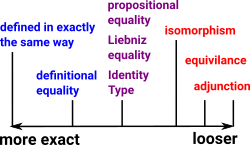Equality Of Types
 |
Equality can be defined in different ways, in some cases we need things to be considered equal only when they are defined in exactly the same way, in other cases we need a looser form of equality where things may be defined differently but behave the same in some way. |
This page discusses definitional equality, for a more general discussion of other types of equality see the page here.
Definitional Equality
More exact equality happens when the terms are both defined in exactly the same way. The name 'definitional equality' usually allows the terms to be 'normalised' before comparing them. This means that any functions can be applied to expressions, if this reduces them.
Computational (Judgemental) Equality
Equality based on conversion or reduction rules.
Example are:
- “(λx.x+x)2” and “2+2” (β-reduction)
- “2+2” (s(s(0))+s(s(0)) reduces to “4” (s(s(s(s(0)))).
This is commonly included in definitional equality
Notes
Those equalities that are given as rewrite rules (equations) or else originate from general functional principles ( β, η, etc.) - Queiroz, Oliveira.
For 'Homotopy Type Theory' book type theory is a deductive system based on two forms of judgment:
| Judgment | Meaning |
|---|---|
| a:A | a is an object of type A |
| a |
a and b are definitionally equal objects of type A |
Definitional equality is a syntactical notion and it has nothing to do with the meaning of the syntactical entries - Nordstrom, Petersson, Smith